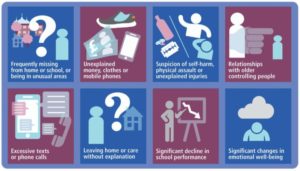Signs of Child Criminal Exploitation (CCE)
For more information on Child Criminal Exploitation (CCE) and its effect on children, click here.
Knowing the signs of child criminal exploitation (CCE) can help give a voice to children. A child is unlikely to know they are being groomed or exploited and might not speak out. Any child can be groomed into exploitation, though some children may be more at risk. Children who are more vulnerable, for example children in care and children with disabilities, may be more heavily targeted by groomers who want the child to become dependent on them.
Any sudden changes in a young person’s lifestyle should be discussed with them. It is important to remember that warning signs will be presented differently for each child or young person being exploited. Teens might also behave in a way that could be seen as ‘normal teenage behaviour’, masking the exploitation.
Signs that a child or young person is being groomed or exploited into criminal activity or county lines include:
- Persistently going missing from school or home and/or being found out-of-area
- Unexplained acquisition of money, clothes, jewellery, or mobile phones
- Excessive receipt of texts or phone calls
- Spending more time online or on their devices
- Using more than one phone
- Suddenly acquiring expensive gifts such as mobile phones, jewellery – even drugs – and not being able to explain how they came by them
- Having hotel cards or keys to unknown places
- Being secretive about who they are talking to and where they are going
- Relationships with controlling older individuals or groups
- Leaving home/care without explanation
- Unexplained absences from school, college, training, or work
- Returning home unusually late or staying out all night
- Coming home looking dishevelled
- Suspicion of physical assault or unexplained injuries
- Carrying weapons
- Starting or increasing drug use, or being found to have large amounts of drugs on them
- Starting or increasing alcohol use
- Loss of interest in school and significant decline in performance
- Using sexual, gang, drug-related or violent language you wouldn’t expect them to know
- Meeting with unfamiliar people or associating with a gang
- Becoming isolated from peers or social networks
- Self-harm
- Significant changes in emotional well-being
- Sudden changes in lifestyle
- Increasingly disruptive or violent behaviour
- Getting into trouble with the police

Click here for NSPCC’s information and guidance on grooming.
If you are concerned about a child, please contact Front Door For Families on 01273 290400, FrontDoorForFamilies@brighton-hove.gov.uk, or use their Online Referral Form.
If a child is in immediate danger, you should contact the police by calling 999.
